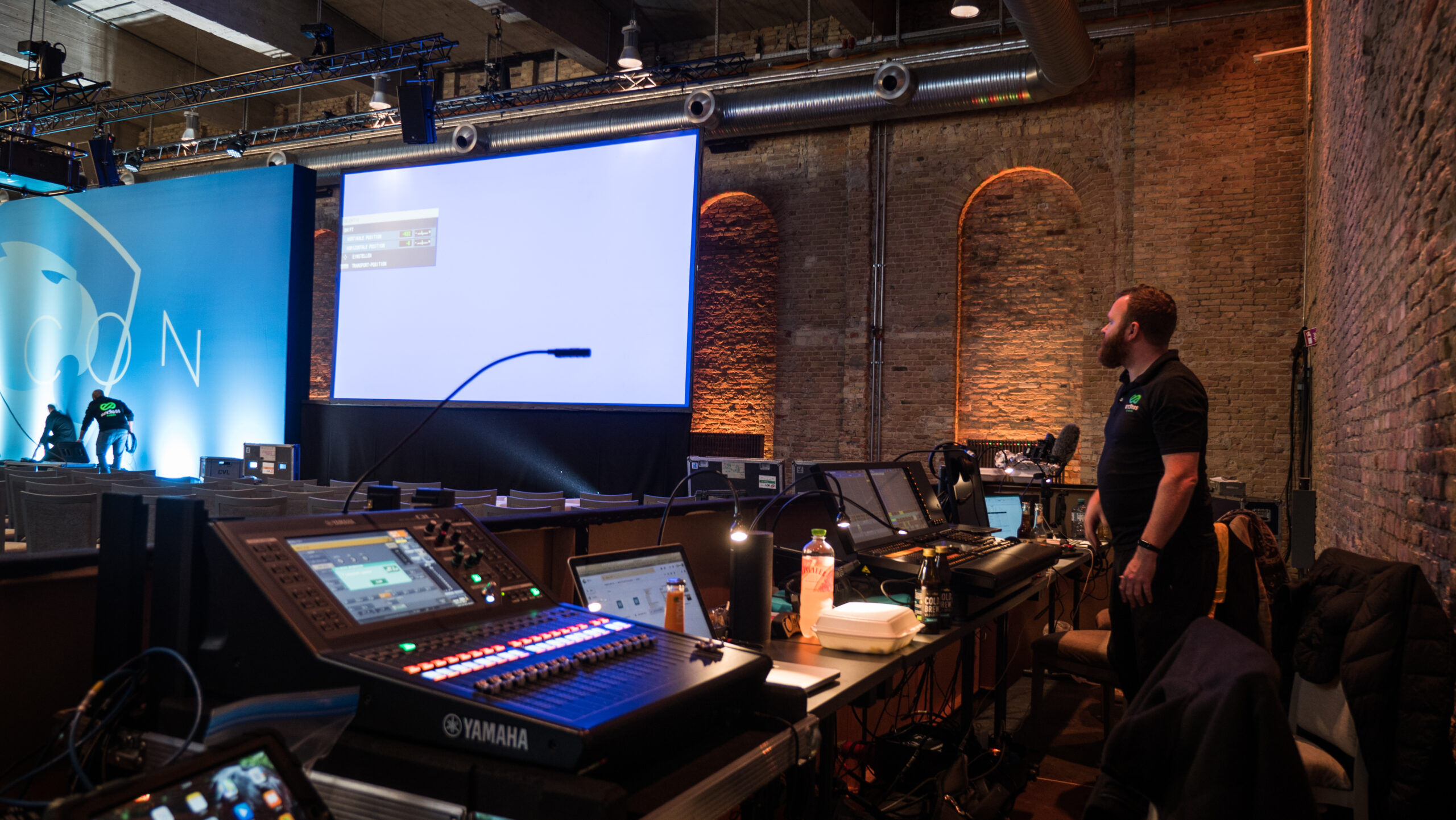How Event Production Works: A Comprehensive Look at the Process
Event production is a complex and organized procedure that needs cautious planning and execution. It starts with developing clear goals and recognizing the target market. Each action, from budgeting to location choice, plays an important function in guaranteeing success. As the process unfolds, numerous aspects need to align seamlessly. The nuances of this detailed procedure typically go unnoticed. What are the crucial stages that add to an unforgettable event?

The Preliminary Planning Stage
When beginning on event production, cautious preparation is necessary to guarantee a successful outcome. The first planning stage works as the structure for all succeeding initiatives. During this phase, event producers should define the event's function and goals clearly. Identifying the target market aids tailor the experience and messaging, guaranteeing importance and engagement.Producers need to likewise consider the event format, whether it be in-person, digital, or hybrid, as this will influence numerous logistical aspects. Selecting a suitable day and location is essential, as it influences availability and availability.Furthermore, setting up a trustworthy team is basic for splitting responsibilities and improving interaction. Establishing a timeline with milestones warranties all tasks are finished on time. This stage includes complete research, consisting of identifying possible challenges and designing techniques to reduce threats. Eventually, a well-structured first planning stage sets the tone for a successful event production trip.

Budgeting and Resource Appropriation
In event production, effective budgeting and resource appropriation are crucial for success - event production charlotte. Developing economic specifications establishes the structure for all subsequent decisions, while source circulation strategies guarantee that every component of the event is adequately supported. With each other, these elements aid preserve control over expenditures and enhance the usage of available resources
Establishing Financial Parameters
Establishing monetary specifications is essential to the success of any event production, as it establishes the foundation for effective budgeting and resource allowance. This procedure starts with specifying the total budget, which encompasses all aspects of the event, including venue costs, food catering, and marketing. By determining offered funds, event organizers can focus on expenditures and assign sources accordingly. In addition, it is necessary to carry out complete market study to expect prospective expenses and identify financing resources, such as sponsorships or ticket sales. Establishing clear financial parameters additionally aids in risk administration, enabling planners to set apart backup funds for unforeseen expenses. Inevitably, a distinct budget plan serves as a roadmap, leading the event production group towards achieving their objectives while preserving financial control.
Source Distribution Strategies
Reliable source distribution strategies are essential for taking full advantage of the impact of an occasion while adhering to spending plan restrictions. Successful event production needs a meticulous strategy to budgeting and resource appropriation. Coordinators should focus on vital elements such as location, catering, and modern technology, guaranteeing that funds are alloted to locations that enhance guest experience. A thorough budget must outline anticipated expenditures and determine locations for potential expense financial savings, such as negotiating with vendors or discovering sponsorship opportunities. Furthermore, tracking expenses throughout the planning process assists protect against overspending. By using tactical resource circulation, event manufacturers can deliver an unforgettable experience while preserving monetary responsibility, ultimately adding to the general success of the event.
Venue Selection and Logistics
Selecting the ideal place is necessary to the success of any event, as it sets the stage for the overall experience. Location option entails reviewing numerous variables, consisting of ability, accessibility, and place. Coordinators need to think about the target market and the nature of the event, making sure the location aligns with the event's goals.Logistics play a significant role in this process, involving arrangements for seats, audiovisual tools, and providing services. A well-chosen place should promote smooth flow for attendees and team, boosting engagement.Additionally, examining prospective places for amenities like car park, bathrooms, and emergency situation departures is essential for safety and convenience. The timeline for safeguarding the location is likewise essential, as prominent locations might reserve rapidly - event production charlotte. Extensive planning and timely implementation can eventually add to a seamless event experience, making place selection and logistics basic components of effective event production.
Imaginative Concept Growth
While the venue sets the physical phase, creative idea growth shapes the event's identification and narrative. This procedure begins with recognizing the event's purpose and target audience, enabling event producers to create a compelling style that reverberates with participants. Brainstorming sessions commonly include diverse perspectives, cultivating innovative ideas that line up with the event's goals.Once a motif is developed, aesthetic components such as shade palettes, signage, and design are made to boost the overall atmosphere. Storytelling methods might additionally be incorporated to develop an engaging journey for participants, guaranteeing an unforgettable experience. In addition, factors to consider concerning enjoyment, tasks, and interactive parts are straightened with the picked principle, reinforcing the theme throughout the event.Ultimately, effective creative concept development warranties that every facet of the event functions cohesively, leaving a long-term impact on guests and meeting the event's purposes. This fundamental work prepares for subsequent planning and execution stages.
Working together With Suppliers and Vendors
Successful event production hinges on effective cooperation with vendors and distributors. Choosing dependable companions, discussing contracts effectively, and ensuring prompt distributions are essential action in this process. Each of these factors adds considerably to the overall success and smooth implementation of an occasion.
Picking Reliable Partners
Exactly how can event planners guarantee a smooth production experience? Choosing reliable companions is necessary in achieving this objective. Event coordinators have to carry out extensive study to recognize suppliers and suppliers with a tried and tested performance history of quality. This includes inspecting references, examining portfolios, and evaluating client responses. Planners need to prioritize partners that show professionalism and trust, timely communication, and a willingness to work together. Structure solid relationships promotes trust fund and makes it possible for quick analytical throughout the event. In addition, it is useful to pick neighborhood vendors who understand the place and regional logistics. Eventually, a successful event depends upon the harmony between coordinators and their partners, ensuring that every element of production runs efficiently and efficiently.
Discussing Contracts Successfully
Reliable negotiation of contracts is an important action in the partnership in between event coordinators and their vendors and distributors. This procedure entails clear interaction of assumptions, deliverables, and timelines. Organizers need to perform thorough research study on market prices and industry requirements to develop a baseline for negotiations. It is very important to produce a collective environment, motivating open dialogue about terms, rates, and possible backups. Planners should likewise focus on recognizing the supplier's abilities and limitations to straighten their demands efficiently. Flexibility can lead to equally valuable agreements, cultivating long-lasting relationships. Crafting well-defined agreements that include certain performance metrics can aid ensure accountability, eventually leading to effective event implementation and satisfaction for all events included.
Making Certain Timely Deliveries
Prompt shipments are important for the smooth implementation of any type of event, requiring thorough partnership between coordinators and their suppliers and providers. Reliable communication is essential, as it assists develop clear expectations pertaining to delivery timetables, quantities, and certain needs. Planners usually create in-depth timelines to outline important milestones, making sure all website here events remain lined up throughout the procedure. Normal check-ins with vendors can aid identify prospective hold-ups early, enabling proactive options. In addition, building strong partnerships with trustworthy distributors fosters count on and responsibility, which can cause far better solution and prioritization. By prioritizing these collaborative initiatives, organizers can lessen disruptions, therefore enhancing the general effectiveness of event production and guaranteeing that all necessary materials and services arrive as planned.
Advertising and Promotion Strategies
While arranging an event, the success of marketing and promo methods can considerably influence attendance and involvement. Reliable techniques typically include a mix of digital marketing, typical marketing, and grassroots outreach. Utilizing social media sites platforms allows for real-time communication and targeted marketing, reaching certain demographics efficiently. Email advertising and marketing campaigns can additionally engage possible guests with personalized material and reminders.Collaborations with influencers or industry leaders can likewise boost reputation and broaden reach. Producing engaging material, such as video clips or blogs, assists to create buzz and suffer passion leading up to the event. Additionally, leveraging early-bird discount rates and unique benefits can incentivize ticket purchases.Promoting via conventional networks, such as posters or neighborhood media, remains pertinent, specifically in community-focused events. An extensive strategy that integrates several methods warranties maximum exposure and involvement, inevitably adding to the event's success and the creation of an unforgettable experience for guests.
On-Site Implementation and Management
On-site execution and administration are vital elements that identify the total success of an event. Reliable coordination during the event guarantees that all elements align with the planned agenda. Event managers supervise logistics, including vendor coordination, equipment setup, and guest services. Keeping an eye on timelines and dealing with any type of unforeseen problems are fundamental for maintaining a seamless experience.The team plays a substantial duty, as skilled workers are accountable for different tasks such as registration, details circulation, and technical support. Interaction among staff member is vital; it promotes a collaborative setting and makes it possible for quick resolution of challenges.Additionally, safety protocols should be adhered to, safeguarding the health of all guests. Post-event evaluations are additionally component of on-site management, providing understandings for future improvements. By concentrating on these elements, event manufacturers can produce memorable experiences that fulfill or surpass attendee assumptions while accomplishing the event's purposes.
Often Asked Questions
How Do I Select the Right Event Style?
Choosing the appropriate event motif includes considering the target market, event purpose, and place. Researching present trends and gathering input from stakeholders can additionally inspire creative concepts that resonate and produce a remarkable experience.

What Prevail Mistakes in Event Production?
Usual errors in event production usually include inadequate preparation, bad communication amongst team participants, budget plan mismanagement, overlooking to consider the target market's requirements, and failing to carry out a complete post-event the original source examination for future improvements.
Exactly How Can I Determine Event Success?
To measure event success, one can assess guest satisfaction, interaction degrees, budget plan adherence, and post-event responses. Secret efficiency indicators, such as check ticket sales and social media communications, also supply valuable understandings right into overall efficiency.
What Should I Do if It Moistens the Event Day?
In the event of moisten the day, the organizer ought to apply contingency plans, such as protecting outdoors tents or moving activities inside. Communication with guests concerning adjustments is necessary to assure a smooth experience despite weather condition obstacles.
Just How Can I Guarantee Participant Interaction During the Event?
